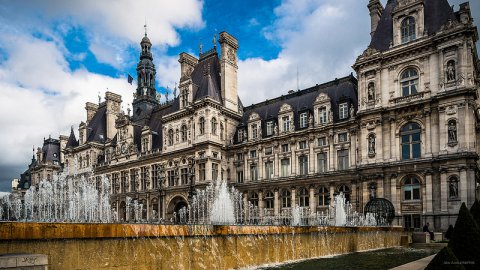
21 February 2014
In 2010 Parisians sacked the private water companies. Now they are reaping the benefits of public cownership and control, writes Stephen Struthers in this blog first published in the Ecologist - and it's high time for the UK to do the same.
We all know that there are some things the French do better than us - like wine, camembert and the romantic whispering of sweet nothings. But running water?
Yes indeed! Parisians ended their love affair with the French water giants Suez and Veolia in 2010 - and now they are enjoying the benefits of a publicly owned water supply, including lower costs and stronger accountability.
It wasn't always so. Private companies had initially helped develop and connect household water supplies. But in the early 20th century, the scale of investment needed and a periodic enthusiasm for nationalisation saw the public sector take over many of them.
2000: 75% of France served by private water companies
However privatisation came back in vogue. Paris's water supply was privatised in 1984 by the then mayor, Jacques Chirac. Long term contracts with three operators were agreed in what can only be described as murky circumstances.
By 2000, the water supply of about three-quarters of the population of France was provided by major private companies, particularly Suez and Veolia - a higher proportion of privatised water services than in any other European country except the UK.
Various audits and public reports quickly highlighted problems in Paris's private water industry: fragmentation and complexity, lack of transparency, loss of any technical oversight by public authorities, weak regulation, and escalating prices.
And they concluded: there was huge potential for financial savings if the system could be brought together under public ownership.
A more robust approach...
The election of Bertrand Delanoe as Mayor at the head of a coalition of Socialists, Communists and Greens in 2001, signalled a more robust approach by the authorities.
Some contracts were renegotiated, but it proved difficult to exert real control over the companies. During the 2008 election campaign, however, Dolanoe made a pledge to re-municipalise the water supply.
Once he was elected, the City Council voted to bring the entire water system under the operation of a single publicly owned entity, Eau de Paris, to deal with everything from protecting fragile water resources to the daily experience of Parisians using tap water.
The transition was not easy. The water companies resisted, and there were major practical problems around such things as IT and property ownership.
A right to water for all
But the re-municipalisation in January 2010 undoubtedly led to better oversight with monitoring and benchmarking against services elsewhere, re-investment of revenues, restraint on prices, and commitment to environmental and social objectives such as a right to water for all.
It also involved an innovative approach to governance with the city authority, employees, consumers and external experts all being represented in decision-making.
In Paris, financial savings have meant lower prices and new investment in facilities, conservation and efficiency, better long term planning for protecting resources and tackling pollution, and more transparency.
Elsewhere in France
In other major cities and regions of France, similar concerns about privatisation failures have been raised. In Bordeaux, re-municipalisation of the water supply is planned.
Here and elsewhere the process is being carried out gradually, particularly where public and private contracts run side by side, as in Rouen or Nantes, and when private sector contracts are due for renewal.
Determined political action is needed to achieve this. There are major practical problems, and the companies and their outriders will fight back.
In Paris, political leaders took the initiative. In Germany too, political activity took the form of a dogged grassroots campaign to force transparency. This led to a successful referendum in 2011, and in September 2013 water was taken back into public ownership in Berlin.
Back in the UKKR...
The contrast with the UK's capital city is illuminating. Londoners have no choice but to use water and sewerage services provided by Thames Water - a company owned by a consortium of overseas investment banks, pension funds and private equity - which regards water customers primarily as a reliable source of cash.
The practical significance of this is that decisions on, say, water management and investment for the future are taken in the financial interests of the owners, and not those of London or indeed the natural environment. Thames is not unique, the other water companies in England (but not Scotland or Wales!) are similar.
The Continental experience shows us how much we are losing out by sticking to failed privatisation. Households in England would save around £80 per year on household bills if water was publicly owned.
And those running our water and sewage systems would be open and accountable to the public about their activities, and forced to prioritise environmental and social objectives.
Our money is draining away
While this may all seem like a distant pipe dream, we can see from elsewhere that privatisation need not be a one- way street, and that with sufficient political resolve, privatised public services can be brought into public ownership and control.
It's time for us Brits to end our love affair with the likes of Severn Trent and Thames Water. They are draining away our money and much of our water supply - while dodging tax and prioritising profits.
We Own It is campaigning for a Public Service Users Bill to give us powers to hold water companies, amongst others, accountable - a first step towards running public services for the benefit of the public.
So next time you turn your tap on and the meter ticks away, just remember where the money goes, and who's really benefitting. We have seen a better way of doing this across the Channel, and it works!

Photo used under Creative Commons licensing, thanks to Louis Engival.
